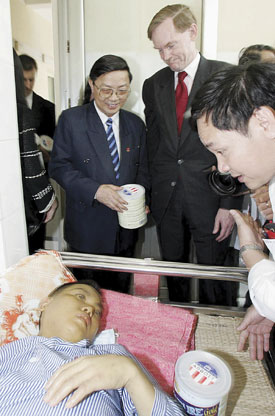|
DAILY NEWS ONLINE |
|
|
|
OTHER EDITIONS |
|
|
|
|
|
|
|
|
|
OTHER LINKS |
|
|
|
|
|
|
 |
The need to be open about safe sexual behaviour in light of the
HIV/AIDS threat
|
|
|
Once it was realised that the anticipated rejection of an 'immoral' campaign was not to be, the Government sector also openly promoted all forms of family planning including the use of condoms.
Sri Lanka's family planning programme has yielded good results with a close to replacement level fertility rate. There was no condom social marketing for diseases prevention.
The FPA has a nation wide presence with urban (35%), semi-urban (25%), and rural areas (40%) coverage. Thirty three percent (33%) condoms target young people specifically. It sells its own brands through a network of around 8,600 retail outlets. It has recently piloted sales through vending machines without much success.
The direct costs of FPA's condoms are recovered by the organisation with minimum support from donors. The FPA uses about 5% of its total annual budget on promotions, which includes print, radio, billboards and point-of-sale materials.
The lower end condoms packs are priced approximately US$ 0.1 and the higher end ones at US$ 0.5 per pack of three. FPA sold approximately 7.2 million condoms in 1998.
Population Services Lanka is the second largest marketer of condoms in the non-governmental sector and sold 758,000 pieces of condoms in 1998. The FPA contributed to 74% of the total condom imports with the Ministry of Health contributing to another 24% and all other importers combined accounting for only 4%.
By 1999, the Government had realised the need for a separate campaign to market condoms for disease prevention.
The WHO as a co-sponsor of UNAIDS supported the government to develop a proposal/report on condoms social marketing for disease prevention, the implementation of which was funded by the World Bank. One finding of the report (based on 1993 data) was that an estimated 13% of the 10 million condoms imported in to the country were not used for family planning purposes.
As there has not been any major factor that could cause a behaviourial change of men over the past 10 years, it may be presumed that only 13% of condoms in Sri Lanka are used for disease prevention currently. Considering Sri Lanka's 19 million population, majority consisting of the sexually active group, the condoms market has a great potential for expansion.
Geographical variations of condom availability in Sri Lanka are substantial.
According to a 1997 study conducted by the National STD/AIDS Control Programme an estimated 90% of the urban population has regular access to condoms whereas only 39% in rural areas had regular access.
There has been an interest in Condom Vending Machines (CVM) as an alternative to outlet sales as the issue of 'closure for the day' of outlets at the time one would mostly need a condom was highlighted.
The first pilot was undertaken by FPA with less than 20 CVMs. This was not considered a success as many of the machines were vandalised.
Recently a pilot project UNFPA as a co-sponsor of UNAIDS undertook on the acceptability of Condom Vending Machines also gave mixed impressions. By 2003, out of 73 CVMs procured in 2001, only 36 were operational with 34 needing repair and 3 not being installed at all.
CVMs installed in institutional setting appear to have the best chances of survival. For example 4 out of the 5 installed in the Army were functional whereas only 3 out of the 15 installed by the FPA in public locations were working. Partly due to the lack of commitment by the Bureau of Investment (BOI), none of the machines meant for the Free Trade Zones were installed.
The UNFPA in its evaluation has noted "NGO's perception of CVMs as a threat to the existing social marketing programme' as a negative contributor to the project.
There is a place for promoting condoms both within the family and without, as there is evidence that most women who get STIs and HIV in the region have got it in spite of being monogamous.
The knee jerk reaction of many adults to a condoms social marketing approach would be to send such approaches under the carpet. Before doing so, let us remember that such actions by us are killing young boys and girls.
(The writer is the Coordinator of the National Centre for Advanced Studies of the University Grants Commission, Sri Lanka).
|
|
 |
 |
 |
 |
 |

